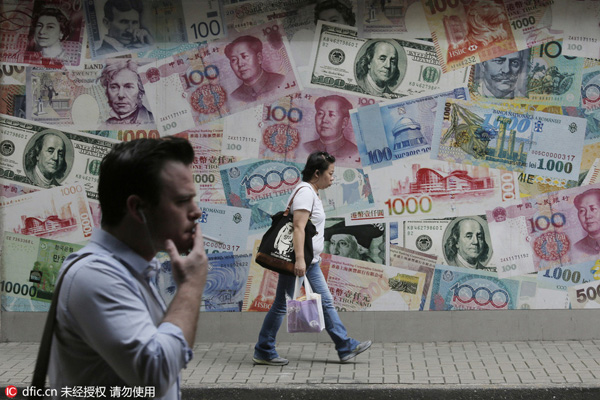IMF: China's RMB broadly in line with fundamentals
Updated: 2016-07-28 15:15
(chinadaily.com.cn)
|
|||||||||
 |
|
People walk past a money exchange decorated with different currencies in Hong Kong, June 27, 2016. [Photo/IC] |
The IMF said China's external imbalance had been reduced since the financial crisis. The current account surpluses narrowed significantly in subsequent years after peaking at approximately 10 percent of Gross Domestic Product (GDP) in 2007, although rebounding to 3 percent of GDP in 2015 due to slow import growth.
Luis Cubeddu, deputy division chief of the Regional Studies Division of the IMF's Western Hemisphere Department, said China's current account surplus is expected to decline, with its exchange rate policy and structural reforms playing a role.
As China's economy turns further toward private consumption and away from external demand, the IMF said the trade surplus is expected to narrow and the services deficit to pick up with healthy outbound tourism over the medium term.
In response to the sizable decline in China's foreign exchange reserves, the first in two decades, economist Gustavo Adler in the Regional Studies Division of the IMF's Western Hemisphere Department said it is still at a reasonable level.
Meanwhile, as the net capital outflows and reserves have become stable, there is no big risk of foreign exchange reserves, he said.
However, IMF said global external imbalances widened again last year after narrowing in the aftermath of the global financial crisis, which is a result of the currency fluctuations driven by the diverging monetary policies adopted by advanced economies, the sharp decline in commodities prices, and the tighter external financing conditions in emerging markets.
Although the exchange rate has been fluctuating greatly, there is no need to take collective action to stabilize the exchange rate, said Cubeddu.
The IMF appealed to countries to shift their reliance from monetary policy to fiscal and structural policies, recommending a more balanced policy mix.
Related Stories
Strong US dollar pushes renminbi to a six-year low 2016-07-19 07:21
Mild, orderly renminbi depreciation seen 2016-06-28 07:29
Renminbi internationalization makes new strides 2016-06-23 16:48
China opens first renminbi clearing bank in South America 2016-06-22 14:51
Investors more upbeat on renminbi 2016-06-22 07:56
Today's Top News
Obama, Merkel stress anti-terror cooperation
Downing Street cat fight: Larry vs Palmerston
No explosion, no injury report in Germany: Police
Geneva airport tightens security after French tipoff
Bill Clinton portrays Hillary as 'change-maker'
Priest, 84, killed in France, attack claimed by IS
Knife attacker in Japan kills 19 at disabled center
Michelle Obama rocks Democratic convention
Hot Topics
Lunar probe , China growth forecasts, Emission rules get tougher, China seen through 'colored lens', International board,
Editor's Picks

|

|

|

|

|

|







